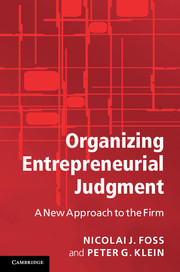Book contents
- Frontmatter
- Contents
- Figures
- Preface
- 1 The need for an entrepreneurial theory of the firm
- 2 What is entrepreneurship?
- 3 Entrepreneurship: from opportunity discovery to judgment
- 4 What is judgment?
- 5 From shmoo to heterogeneous capital
- 6 Entrepreneurship and the economic theory of the firm
- 7 Entrepreneurship and the nature and boundaries of the firm
- 8 Internal organization: original and derived judgment
- 9 Concluding discussion
- References
- Index
8 - Internal organization: original and derived judgment
Published online by Cambridge University Press: 05 June 2012
- Frontmatter
- Contents
- Figures
- Preface
- 1 The need for an entrepreneurial theory of the firm
- 2 What is entrepreneurship?
- 3 Entrepreneurship: from opportunity discovery to judgment
- 4 What is judgment?
- 5 From shmoo to heterogeneous capital
- 6 Entrepreneurship and the economic theory of the firm
- 7 Entrepreneurship and the nature and boundaries of the firm
- 8 Internal organization: original and derived judgment
- 9 Concluding discussion
- References
- Index
Summary
The entrepreneurship literature in economics and management is biased towards start-up firms. And yet, profit opportunities are imagined, evaluated, and captured by existing firms. Employees often play a key role for developing and pursuing business opportunities (Baumol, 1994; Bhardwaj, Camillus, and Hounshell 2006). In fact, modern firms increasingly encourage “intrapreneurship,” “autonomous strategic initiatives,” and “corporate venturing” at all levels of the organization (e.g., Day and Wendler, 1998; Yonekura and Lynskey, 2002; Covin and Miles, 2007; De Clercq, Castaner, and Belausteguigoitia 2007). Clayton Christensen’s Innovator’s Dilemma (1997), one of the most influential business books of the last two decades, deals with the difficulties facing established firms that try to innovate.
To foster entrepreneurial attitudes and behavior, managers must give employees significant discretion. The need for such entrepreneurial attitudes is partly driven by deep-seated changes, sometimes placed under the rubric of the “knowledge economy” (Foss, 2005). Thus, greater variability in the environments firms confront, more emphasis on innovation as a competitive tool, an increased need to source heterogeneous knowledge inputs, and so on call for an increased reliance on decision-making within firms that is not only fast, but also adaptive and intelligent. This amounts to an increase of delegation of discretion to employees at all levels in order to make them exercise responsible judgment. Cowen and Parker (1997: 28) cogently summarize this line of thinking:
Market changes are moving manufacturing farther and farther away from steady-state, low variety, long-batch production runs, relevant to Taylorist methods, to high variety and small runs … Organizations are adopting new forms of decentralization to cope with the instability, uncertainty, and pace of change of the market-place … In clusters of network working, employees of undifferentiated rank may operate temporarily on a certain task or tasks in teams. The clusters are largely autonomous and engage in decentralized decision-making and planning … They are conducive to individual initiative (“intrapreneurship”) and faster decision-taking. They facilitate organizational flexibility.
- Type
- Chapter
- Information
- Organizing Entrepreneurial JudgmentA New Approach to the Firm, pp. 188 - 220Publisher: Cambridge University PressPrint publication year: 2012



